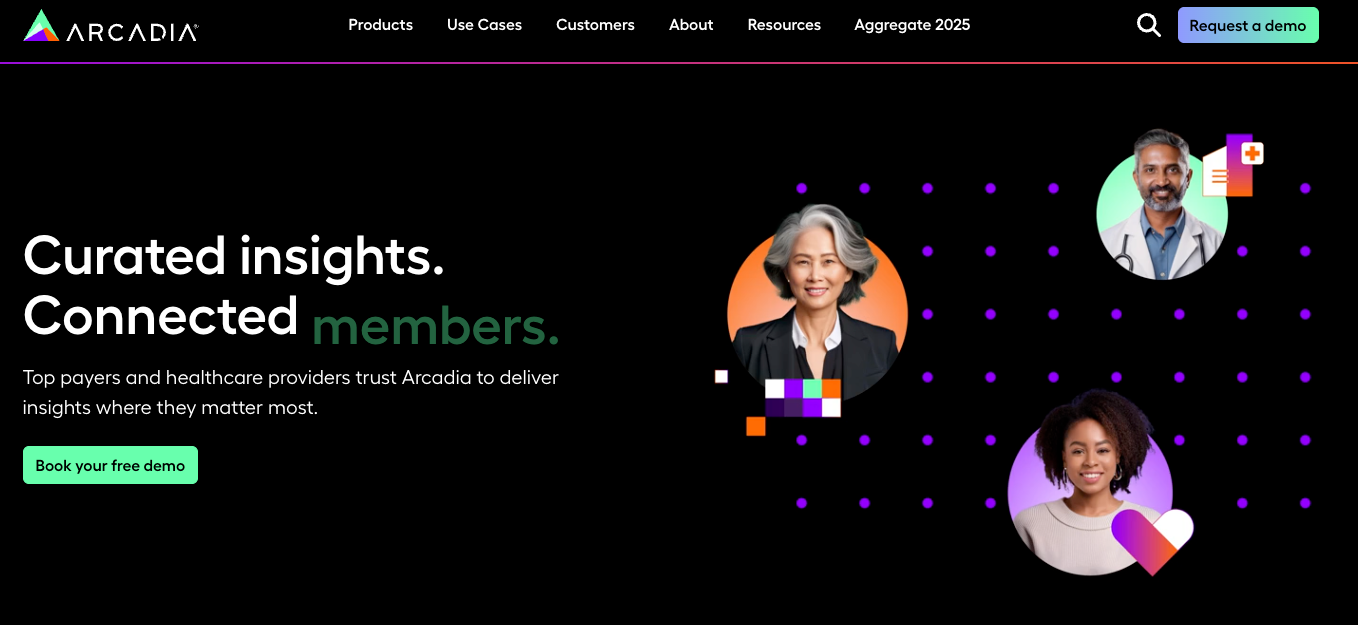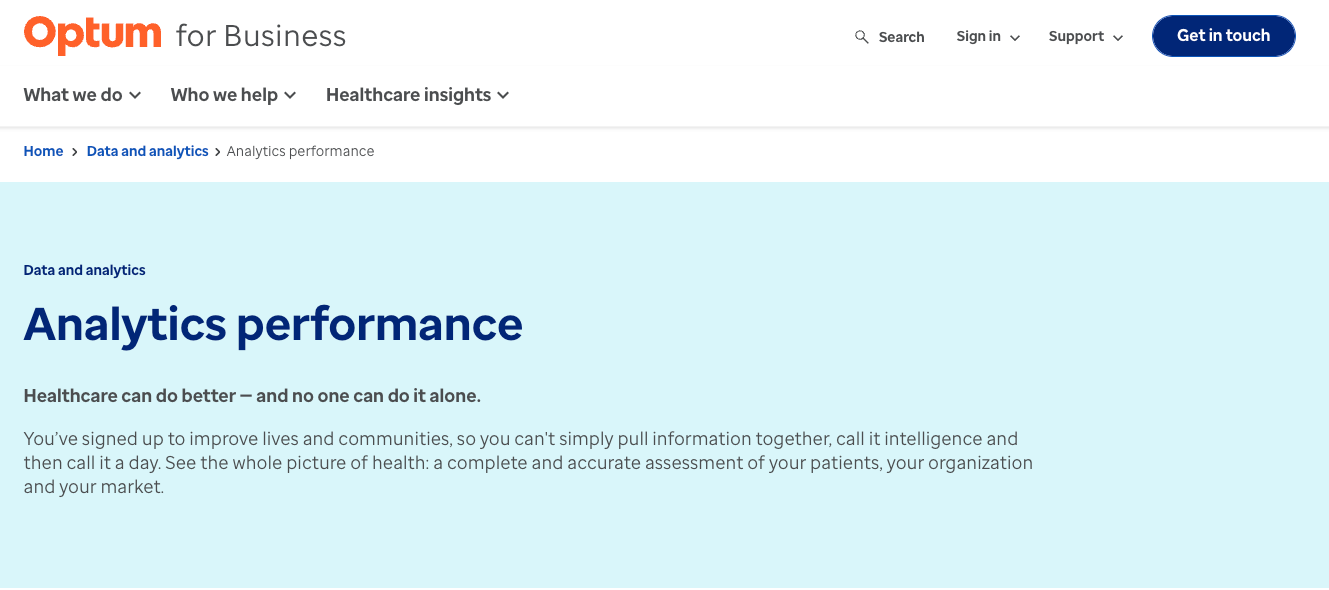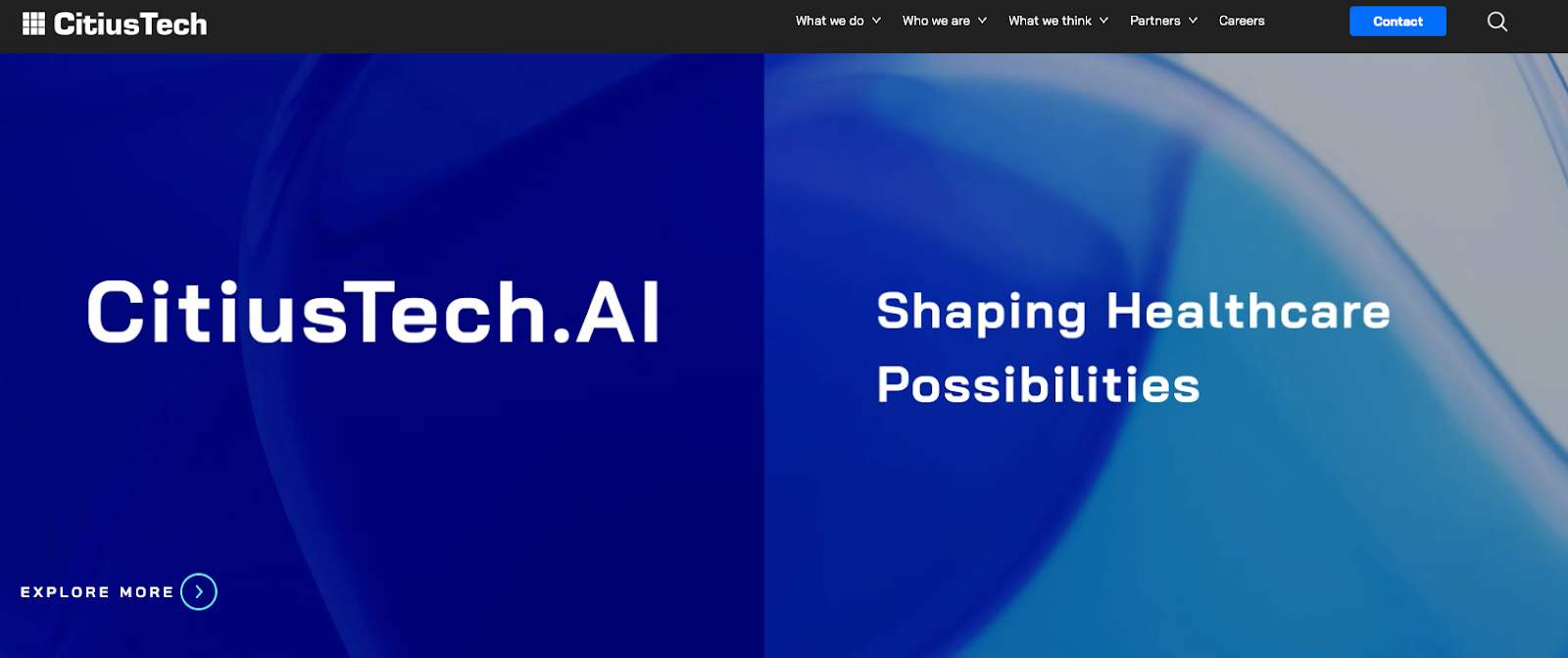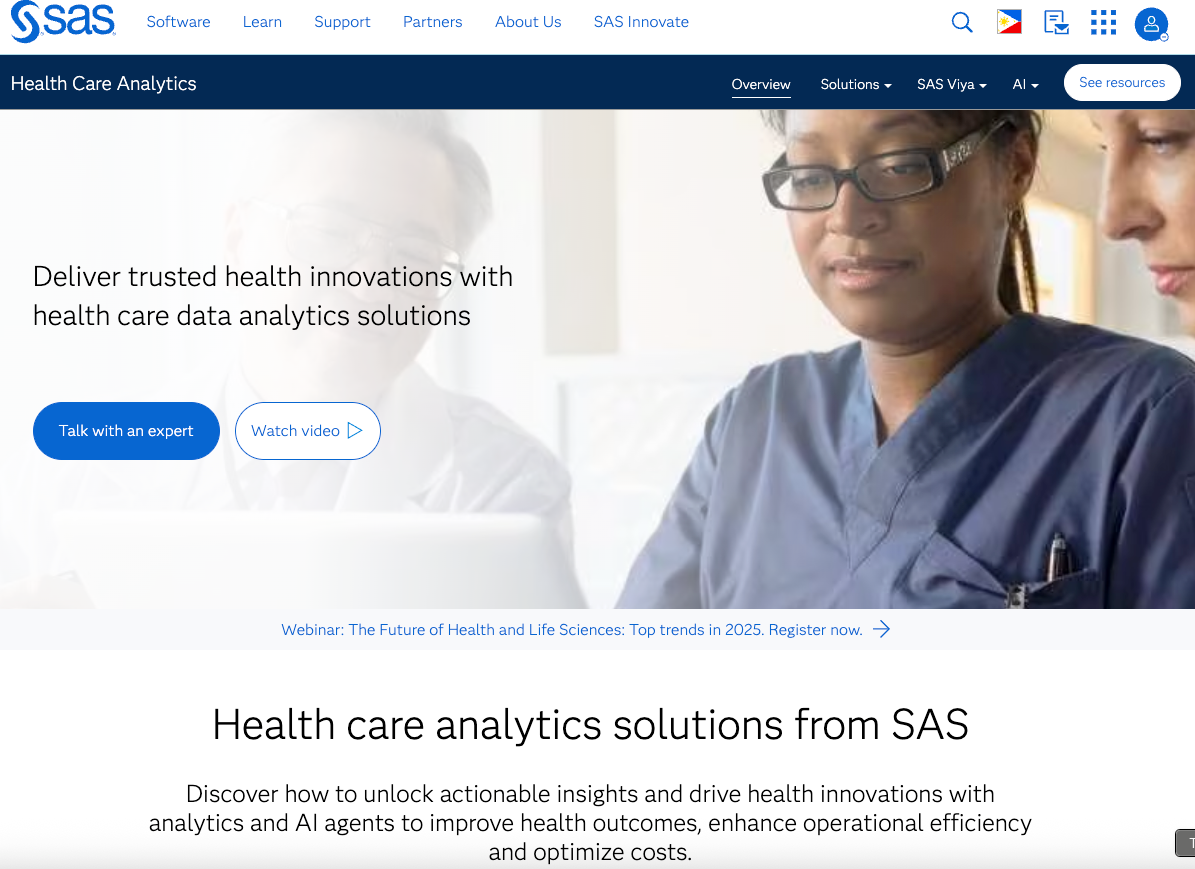Healthcare organizations generate massive amounts of data every day, but without the right expertise, most of it never translates into better outcomes.
A strong health data analytics partner can change that. Helping you uncover insights that improve patient care, reduce costs, and make operations more efficient.
The real challenge is finding a partner that goes beyond generic data processing. You need a team that understands strict healthcare regulations, can integrate with legacy systems, and delivers insights that actually drive clinical and business decisions.
In this guide, we highlight the top health data analytics software development companies with proven healthcare expertise, advanced technology, and a track record of successful implementations.
Key Takeaways
- Healthcare-Specific Expertise Matters: The best companies understand HIPAA compliance, EHR integration challenges, and clinical workflows from day one.
- Custom Solutions Drive Better ROI: Organizations that build solutions around your specific data sources and use cases deliver more value than one-size-fits-all platforms.
- Integration Capabilities Are Critical: Your analytics partner must seamlessly connect with existing EHRs, billing systems, and other healthcare IT infrastructure.
- Scalable Architecture Supports Growth: Choose partners who can scale from pilot programs to enterprise-wide deployments without major rebuilds.
- Ongoing Support Makes the Difference: The most successful implementations combine powerful technology with strategic guidance and continuous optimization.
1. Pi Tech

At Pi Tech, we build custom health data analytics solutions that solve real-world challenges for healthcare organizations. Instead of pushing generic platforms, we work directly with healthcare leaders to understand their unique needs and design solutions that integrate smoothly with existing systems and workflows.
What sets us apart is how we approach healthcare analytics. We don’t just deliver dashboards. We create complete data ecosystems that connect disparate sources, maintain compliance, and generate insights that clinicians and administrators can act on.
Through our Specless Engineering methodology, we start with your objectives and adapt as we learn what delivers the best results for your organization.
Our expertise covers population health management, clinical decision support, operational efficiency tracking, and financial performance analysis. We’ve helped providers reduce readmission rates, identify at-risk patients earlier, and optimize resources across departments.
Our team is made up of senior developers who understand both healthcare and data analytics. This combination is rare but critical because healthcare data demands specialized knowledge to address challenges around privacy, interoperability, and clinical relevance.
Why Pi Tech Stands Out for Healthcare Analytics:
- Healthcare-First Development: Every solution is built with HIPAA compliance, clinical workflows, and healthcare-specific data challenges in mind from the start.
- Custom Integration Approach: We connect with your existing EHRs, billing systems, and clinical applications without forcing you to change successful processes.
- Rapid Deployment Methodology: Our Specless Engineering approach gets analytics solutions running faster than traditional specification-heavy processes.
- Senior Healthcare Technology Expertise: Our developers combine deep healthcare industry knowledge with advanced analytics and software development skills.
- Ongoing Partnership Model: We provide continuous optimization and enhancement as your data needs evolve and your organization grows.
Ready to unlock the full potential of your healthcare data? Partner with Pi Tech today and let’s build analytics solutions that transform patient care, streamline operations, and drive measurable results.
2. Arcadia

Arcadia offers a cloud-based data platform specifically designed for healthcare organizations pursuing value-based care. Their platform connects over 2,600 claims and EHR sources, processing more than 170 million clinical patient records to provide comprehensive patient views.
The company's strength lies in their focus on financial sustainability within value-based care frameworks. Arcadia's platform combines clinical data with social determinants of health, pharmacy records, and other sources to create predictive models for care gaps and risk stratification.
Healthcare organizations working with Arcadia benefit from their dedicated customer insights team, which helps unlock potential through EHR integration, financial optimization, and care management insights. The platform offers strong scalability and customization based on specific organizational needs.
Why Arcadia Excels:
- Proven Scale: Processes over 170 million patient records with strong performance metrics
- Value-Based Care Focus: Specifically designed for organizations transitioning to or optimizing value-based payment models
- Comprehensive Data Integration: Connects clinical, financial, and social determinants data for holistic patient views
- Customer Success Focus: Dedicated insights team provides ongoing strategic guidance
- KLAS Recognition: Five-time recognition by KLAS Research demonstrates consistent customer satisfaction
3. Health Catalyst

Health Catalyst provides data analytics applications, data warehousing, and outcomes-improvement services specifically for healthcare organizations. Their machine learning-driven solutions integrate disparate data from across healthcare ecosystems to eliminate redundant processes and reduce reporting time.
The company's approach focuses on creating a unified view of organizational data that supports both clinical and operational decision-making. Health Catalyst's platform includes modules for population health, quality improvement, and financial performance that work together to provide comprehensive organizational insights.
Their services include EHR integration, health informatics consulting, and revenue cycle management analytics. Health Catalyst has built a reputation for helping healthcare organizations achieve measurable improvements in both clinical outcomes and operational efficiency.
Why Health Catalyst Leads:
- Machine Learning Integration: Advanced algorithms identify patterns and predict outcomes across large datasets
- Comprehensive Service Model: Combines technology platform with consulting services for complete implementations
- Proven Outcomes Focus: Track record of helping organizations achieve specific, measurable improvements
- Enterprise-Grade Platform: Handles complex, multi-facility deployments with robust data governance
- Industry Recognition: Consistent recognition for innovation and customer satisfaction in healthcare analytics
4. Optum Analytics

As part of UnitedHealth Group, Optum Analytics brings significant resources and healthcare industry expertise to data analytics solutions. Their platform provides personalized insights for network planning, service-line profitability analysis, and patient care management across healthcare organizations.
Optum's core services span financial and payment analytics, clinical services optimization, and medication management insights. Their analytics solutions work across the full spectrum of healthcare operations, from provider network optimization to patient engagement strategies.
The company's global reach and extensive healthcare industry experience make them particularly strong for large health systems and organizations with complex operational requirements. Optum Analytics offers solutions that scale from individual provider practices to multi-state health systems.
Why Optum Analytics Excels:
- Healthcare Industry Depth: Deep understanding of healthcare operations across all segments
- Comprehensive Service Portfolio: Analytics solutions for every aspect of healthcare operations
- Enterprise Scale Capabilities: Resources to handle the largest, most complex healthcare deployments
- Integrated Healthcare Ecosystem: Connection to broader UnitedHealth Group capabilities and data sources
- Proven Implementation Track Record: Extensive experience with successful large-scale analytics deployments
5. CitiusTech

CitiusTech specializes in data science and AI applications for healthcare organizations, focusing on transforming healthcare systems through innovative technology solutions. Their approach combines deep understanding of healthcare data with advanced analytics capabilities to drive accurate, actionable insights.
The company's platform unifies data for intuitive analysis across departments including revenue cycle management, value-based care analytics, and quality compliance reporting. CitiusTech's solutions support decision-making throughout the care continuum with next-generation technology and analytics expertise.
Their focus on AI and machine learning applications in healthcare sets them apart, particularly in areas like predictive analytics for patient outcomes and operational optimization. CitiusTech works with healthcare organizations to implement analytics solutions that drive measurable improvements in both clinical and business performance.
Why CitiusTech Stands Out:
- AI and Data Science Focus: Advanced machine learning applications specifically designed for healthcare use cases
- Comprehensive Healthcare Understanding: Deep knowledge of healthcare data, processes, and key performance indicators
- Cross-Department Analytics: Solutions that support decision-making across all healthcare operational areas
- Innovation-Driven Approach: Continuous development of new analytics capabilities and applications
- Proven Healthcare Results: Track record of helping organizations achieve meaningful improvements through analytics
6. SAS Healthcare

SAS brings decades of analytics expertise to healthcare applications, offering solutions that embed AI, image analytics, and machine learning for improved clinical precision. Their healthcare analytics platform supports population health management, healthcare operations optimization, and financial performance analysis.
The company's partnership with Microsoft provides healthcare organizations with familiar tools while delivering advanced analytics capabilities. SAS solutions are designed to scale from individual provider practices to large health systems with complex analytical requirements.
SAS healthcare analytics applications include predictive modeling for patient outcomes, operational efficiency optimization, and financial performance tracking. Their platform combines traditional business intelligence with advanced machine learning capabilities specifically adapted for healthcare use cases.
Why SAS Healthcare Leads:
- Decades of Analytics Experience: Long track record of successful analytics implementations across industries
- Advanced AI Integration: Machine learning and artificial intelligence capabilities specifically adapted for healthcare
- Microsoft Partnership: Integration with familiar Microsoft tools reduces implementation complexity
- Comprehensive Solution Portfolio: Analytics solutions for clinical, operational, and financial healthcare applications
- Enterprise-Grade Platform: Proven ability to handle large-scale, complex healthcare analytics deployments
7. IBM Watson Health

As one of the most established technology leaders in healthcare and life sciences, IBM helps organizations harness the power of data and AI to drive real healthcare innovation.
Instead of offering a single analytics tool, IBM provides a complete ecosystem of solutions, covering data management, AI, automation, hybrid cloud, and cybersecurity, all designed to help you turn complex healthcare data into actionable insights.
With IBM watsonx™, you can put generative AI to work across your most critical workflows. That means faster claims processing, more efficient supply chains, improved patient engagement, and smarter clinical research. IBM ensures your data is AI-ready through robust governance and security features, while its hybrid cloud platform gives you the flexibility to manage workloads seamlessly and securely.
When you work with IBM Consulting, you’re not just buying technology; you’re gaining a partner that understands healthcare workflows, compliance challenges, and operational complexity. Their track record includes collaborations with Moderna, Pfizer, Humana, and NHS Trusts, where IBM’s technology has helped improve patient outcomes, streamline operations, and accelerate innovation.
Why IBM Is a Top Partner for Healthcare Analytics
- AI-Powered Analytics: Watsonx™ helps you make smarter, faster, and more reliable decisions.
- Data-First Approach: governance and security tools ensure your healthcare data is ready for AI.
- Comprehensive Solutions: analytics that span clinical, operational, and business needs.
- Proven Results: trusted by leading health systems, payers, and pharmaceutical innovators.
- Scale and Expertise: built for global healthcare leaders but adaptable to your organization’s needs.
What Software Is Used for Healthcare Analytics?
Healthcare analytics software isn’t a single type of tool. It spans several categories, each designed to solve specific challenges in clinical care, operations, or financial management.
If you’re evaluating options, here are the main types of software you’ll come across:
- Electronic Health Record (EHR) Analytics. These tools sit on top of EHR systems to analyze clinical data, track outcomes, and highlight care gaps. Popular options include Epic’s built-in reporting tools, Cerner’s analytics modules, and third-party solutions that connect across multiple EHR platforms.
- Business Intelligence (BI) Platforms. Tools like Tableau, Power BI, and QlikView give you flexible dashboards and reporting for clinical and operational data. In healthcare, they’re usually customized to meet strict privacy and compliance requirements.
- Population Health Management Software. These platforms analyze data across entire patient populations, combining clinical records, claims, and social determinants of health, to uncover trends, predict outcomes, and guide public health initiatives.
- Clinical Decision Support Systems (CDSS). CDSS tools provide real-time recommendations at the point of care by analyzing patient data against clinical guidelines and the latest research. They can suggest diagnoses, treatment options, or preventive measures.
- Revenue Cycle Analytics Tools. Focused on the financial side of healthcare, these tools dig into billing, claims, and operational data to optimize revenue capture and reduce costs.
What Are the Four Types of Data Analytics in Healthcare?
In healthcare, data analytics isn’t one-size-fits-all. Organizations use four distinct approaches, each building on the other to provide a more complete picture of care and operations.
It all starts with descriptive analytics, which answers the question “What happened?” By looking at historical data, you can track patient outcomes, review operational performance, and analyze financial trends. This gives you a baseline understanding of where things stand today.
Once you know what happened, the next step is diagnostic analytics, which digs into “Why did it happen?” Here, relationships between variables are examined to uncover root causes. For example, you might learn why certain patients are readmitted more often or identify what’s slowing down your hospital’s workflows.
Armed with that knowledge, you can move into predictive analytics, which looks ahead to answer “What will happen?” By applying statistical models and machine learning, healthcare organizations can forecast which patients are at risk of developing chronic conditions, predict readmission rates, or anticipate staffing and resource needs.
Finally, the most advanced stage is prescriptive analytics, which takes predictions and turns them into clear recommendations. This is where analytics answers “What should we do?”, whether it’s suggesting treatment protocols, optimizing staff schedules, or redesigning workflows for greater efficiency.
When used together, these four types of analytics create a powerful cycle. You start by understanding what happened, uncover why it occurred, anticipate what’s coming next, and decide on the best course of action, all with data guiding every step.
How to Choose the Right Health Data Analytics Partner
Choosing a health data analytics partner isn’t just about comparing features; it’s about finding a team that understands your world and can grow with you. To make the right choice, here are the key factors you’ll want to evaluate:
1. Healthcare Industry Experience
Healthcare industry experience should be your first consideration when evaluating analytics partners. Look for companies who understand healthcare-specific challenges like HIPAA compliance, clinical workflow integration, and the unique requirements of healthcare data.
Partners with proven track records in healthcare will navigate regulatory requirements and implementation challenges more effectively than general analytics companies trying to adapt their solutions for healthcare use.
2. Technical Integration Capabilities
Technical integration capabilities determine how well an analytics solution will work with your existing systems. Your partner should demonstrate experience integrating with your specific EHR platform, billing systems, and other healthcare IT infrastructure.
Ask for examples of similar integrations and references from organizations with comparable technical environments. The best partners can show you working examples of integrations rather than just promising they can figure it out.
3. Scalability and Flexibility
Scalability and flexibility become important as your analytics needs grow over time. Choose partners who can start with pilot implementations and scale to enterprise-wide deployments without requiring complete rebuilds.
The best partners offer modular approaches that let you add capabilities over time as your organization's analytics maturity increases. This approach reduces initial investment risk while providing a clear path for expansion.
4. Compliance and Security Expertise
Compliance and security expertise cannot be overlooked when selecting healthcare analytics partners. Your chosen company must demonstrate thorough understanding of HIPAA requirements, data encryption standards, and healthcare privacy regulations. Look for certifications and compliance frameworks that show their commitment to healthcare data security. Ask specific questions about how they handle protected health information and what safeguards they implement.
5. Ongoing Support and Partnership
Ongoing support and partnership matters more in healthcare analytics than in many other technology implementations. Healthcare organizations need partners who provide strategic guidance, continuous optimization, and support for evolving regulatory requirements.
The best partnerships combine technology implementation with ongoing consulting and improvement services that help you get maximum value from your analytics investment.
Benefits of Custom Healthcare Analytics Solutions
While off-the-shelf platforms can be useful, they rarely account for the complexities of healthcare. If your organization has specific needs, legacy systems, or strict compliance requirements, a custom healthcare analytics solution can deliver far greater value. Here’s why:
- Seamless EHR Integration becomes possible when analytics solutions are built specifically for your technology environment. Custom solutions can connect with your EHR's specific data structures, clinical workflows, and user interfaces without requiring workarounds or compromises that reduce efficiency.
- Regulatory Compliance by Design means that custom solutions can be built with your specific compliance requirements from the ground up. Rather than configuring generic platforms to meet healthcare regulations, custom solutions incorporate HIPAA, FDA, and other regulatory requirements into their core architecture.
- Clinical Workflow Optimization happens when analytics tools are designed around how your clinicians and staff actually work. Custom solutions can match your existing processes while gradually introducing improvements, rather than forcing users to adapt to rigid software workflows.
- Scalable Architecture allows custom solutions to grow with your organization's needs. Unlike platform-based solutions that may require expensive upgrades or replacements as you scale, custom analytics solutions can be designed with growth in mind from the beginning.
- Competitive Advantage comes from analytics capabilities that are specifically designed for your organization's unique strengths and market position. Custom solutions can incorporate proprietary data sources, specialized clinical protocols, or innovative care delivery models that differentiate your organization.
Why Pi Tech Leads in Healthcare Analytics Development
At Pi Tech, we combine deep healthcare expertise with advanced software development to deliver analytics solutions that create measurable impact for healthcare organizations.
Our Specless Engineering approach starts with your objectives, not a rigid platform. This flexibility ensures we design solutions around your real challenges, solving problems instead of introducing new ones.
Every project is led by senior developers who understand both the technical complexities of data analytics and the specific demands of healthcare operations. This rare combination is what makes our implementations both reliable and effective.
We build custom healthcare solutions such as custom dashboards, predictive analytics platforms, clinical decision support tools, and operational efficiency systems, all designed to integrate seamlessly with your existing EHR, billing, and clinical applications.
Most importantly, we don’t stop at deployment. Our approach combines immediate problem-solving with long-term strategy, helping your team build lasting analytics capabilities that grow stronger over time.
Final Thoughts
The right health data analytics partner can transform your organization's ability to improve patient care, reduce costs, and operate efficiently. But choosing the wrong partner can result in expensive implementations that don't deliver real value.
The companies on this list have proven their ability to turn healthcare data into actionable insights that drive meaningful improvements. Each offers different strengths, so the best choice depends on your specific needs, technical environment, and organizational goals.
Pi Tech's approach to healthcare analytics development focuses on building solutions that actually work for healthcare organizations. We combine deep healthcare industry expertise with flexible development methodologies to create analytics capabilities that grow with your organization.
Ready to see how custom healthcare analytics can drive better outcomes for your organization? Get in touch with Pi Tech today to discuss your specific challenges and explore how we can help turn your data into your competitive advantage.
Frequently Asked Questions
What's the Difference Between Healthcare Business Intelligence and Healthcare Analytics?
Healthcare business intelligence typically focuses on reporting and dashboards that show what has already happened, using historical data to track performance metrics. Healthcare analytics goes beyond reporting to include predictive modeling, machine learning applications, and prescriptive recommendations that help organizations understand why things happen and what actions to take.
How Long Does it Typically Take to Implement a Healthcare Analytics Solution?
Implementation timelines vary significantly based on the solution's complexity and scope. Simple dashboard implementations might take 2-3 months, while comprehensive analytics platforms can require 6-12 months for full deployment. Custom solutions often have faster time-to-value because they're built specifically for your environment and workflows.
What are the Most Important Compliance Considerations for Healthcare Analytics?
HIPAA compliance is fundamental, requiring proper data encryption, access controls, and audit trails. Organizations must also consider state-specific privacy laws, FDA regulations for clinical decision support tools, and industry standards like HITRUST. The best analytics partners understand these requirements and build compliance into their solutions from the start.







